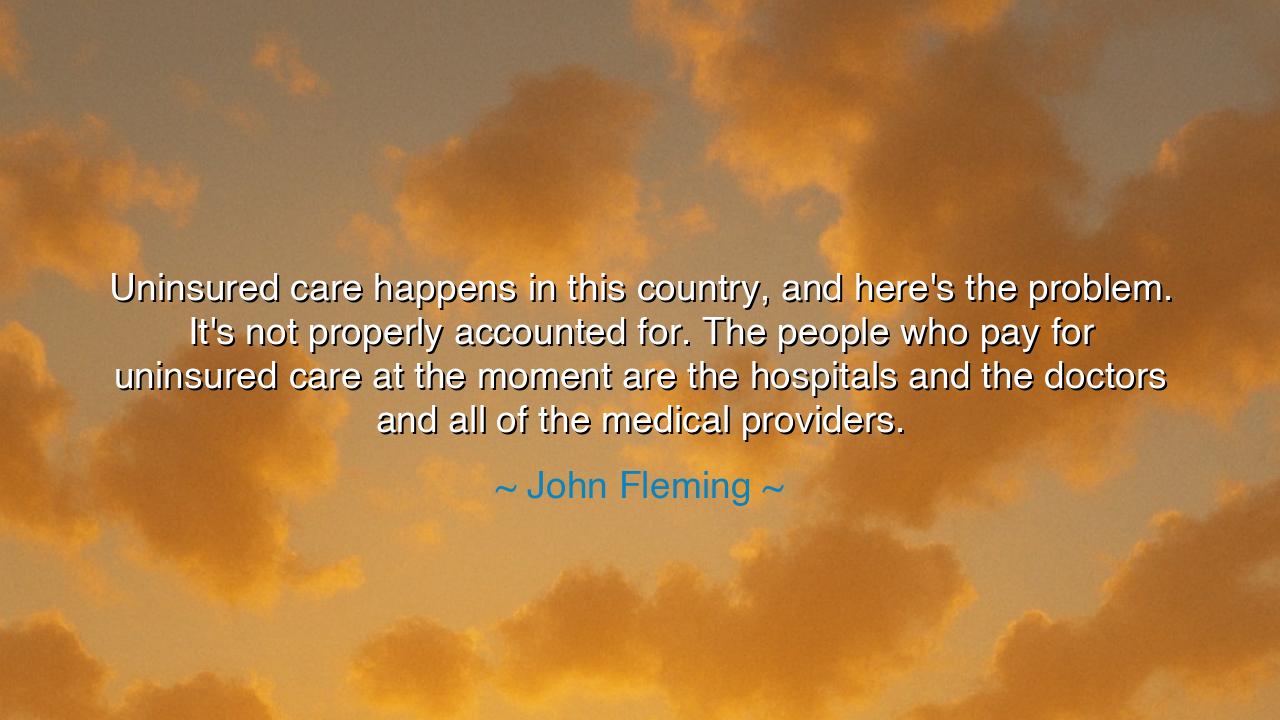
Uninsured care happens in this country, and here's the problem.
Uninsured care happens in this country, and here's the problem. It's not properly accounted for. The people who pay for uninsured care at the moment are the hospitals and the doctors and all of the medical providers.






The words of John Fleming resound with the weight of both truth and lament: “Uninsured care happens in this country, and here’s the problem. It’s not properly accounted for. The people who pay for uninsured care at the moment are the hospitals, the doctors, and all of the medical providers.” His statement, though grounded in the language of policy and economics, carries a moral resonance that echoes through the ages. It speaks of burden borne in silence—of healers who continue to give, even when the system fails to recognize their sacrifice. Beneath these words lies a timeless struggle: how a society measures the worth of compassion, and how it honors those who give without promise of return.
To understand his meaning, one must first understand the nature of uninsured care. In the modern world, medicine is both a science and a service. When the sick arrive at the doors of a hospital—whether rich or poor, insured or destitute—the healer’s duty is clear: to treat, to preserve, to save. Yet when that patient has no means to pay, the burden of their recovery does not vanish—it merely shifts. It falls upon the doctors who refuse to turn them away, upon the hospitals that must keep their doors open, and upon the medical providers who sustain the structure of compassion even as it strains under the weight of neglect. What Fleming reveals is not simply an issue of finance, but an imbalance of justice—a truth that the generosity of the few too often carries the debts of the many.
This truth is ancient. In every civilization, the healer has stood at the border between mercy and survival. In the temples of Asclepius in Greece, and in the monastic infirmaries of medieval Europe, the care of the poor was a sacred duty. Yet even then, such acts of charity came at a cost. The monks who healed also went hungry; the physicians who treated beggars sometimes lost the favor of kings. Fleming’s quote is a modern echo of that same eternal paradox: that compassion, while holy, must be sustained by structure. If the system forgets to account for the unseen labors of its healers, it risks allowing the very foundations of care to crumble beneath the weight of unspoken sacrifice.
Consider the story of Dr. Elizabeth Blackwell, the first woman physician in the United States. In the 19th century, she opened clinics for poor women and children who could not afford treatment. Her work was revolutionary—but she often struggled to keep her doors open. Donations ran dry, patients could not pay, and yet she persevered, believing that to heal even one life was worth every hardship. Her struggle mirrors the one Fleming describes: when care is given freely but not sustained, the healer bears the debt of compassion alone. Over time, this imbalance weakens not only individuals, but the very spirit of medicine itself.
When Fleming speaks of the need for proper accounting, his call is not merely economic—it is ethical. To “account” for something is to acknowledge it, to bring it into the light. What he demands is not gratitude, but awareness: that society must see the invisible labor that sustains it. The medical providers who carry the cost of the uninsured do so because their conscience will not allow abandonment. Yet conscience cannot replace justice forever. If we, as a people, fail to build systems that value and support those who serve, then compassion itself becomes endangered. A society that expects endless generosity without sustenance is like a body that draws from the heart without ever letting it rest—it will, in time, collapse.
There is also a lesson here about shared responsibility. The uninsured are not simply the concern of the healer; they are the concern of the nation. When illness strikes one, it weakens the whole, for the health of a community is an indivisible thing. The ancients knew this well. In the city-states of Greece, public physicians were paid by the people, not by individuals, for they understood that wellness was a common good. To neglect the sick was to invite decay upon the state itself. Fleming’s quote calls us to remember this truth: that care cannot remain the burden of a few; it must be the duty of all.
And so, my child of reflection, take from these words a moral lesson as enduring as medicine itself. When you see the healer, see not only the one who cures, but the one who sacrifices. When you speak of policy or systems, remember that behind every number stands a soul who chose mercy over comfort. Support those who serve, not out of pity, but out of recognition that they uphold the light that keeps the darkness at bay.
For in the end, John Fleming’s words are not a complaint—they are a call. A call to build a society that honors its healers, that measures wealth not in profit but in the wellbeing of its people. Let us, then, create a world where compassion is not a burden but a shared inheritance, where hospitals, doctors, and medical providers need not carry the hidden cost of kindness alone. For only then will the promise of healing—ancient and eternal—truly belong to all.






AAdministratorAdministrator
Welcome, honored guests. Please leave a comment, we will respond soon